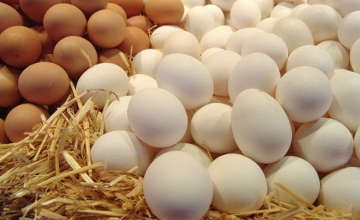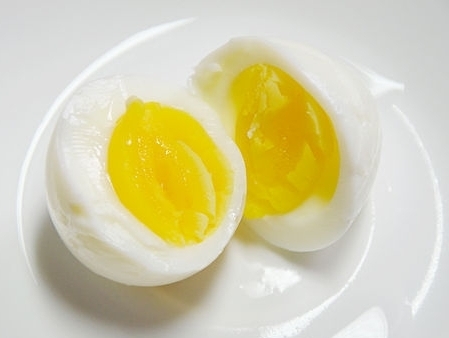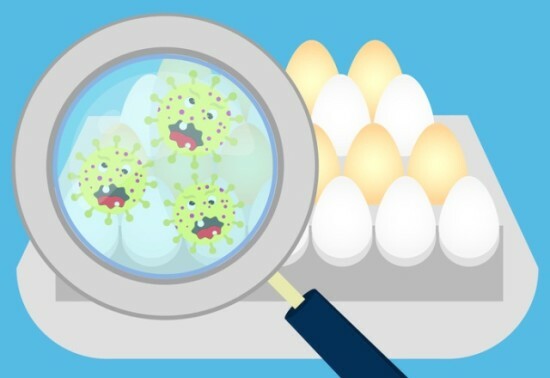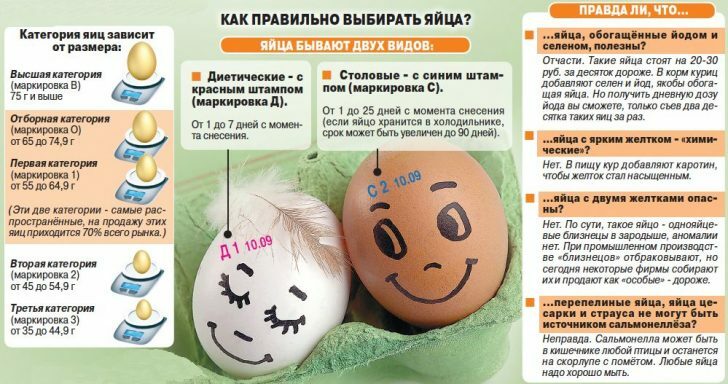Chicken Eggs: Benefit and Harm
 Chicken eggs are a product that is present in almost everyone's menu.They can have a dark and light color of the shell - this depends on what kind of breed was the chicken that carried the egg.But the color of the shell does not in any way affect the quality characteristics of the product.
Chicken eggs are a product that is present in almost everyone's menu.They can have a dark and light color of the shell - this depends on what kind of breed was the chicken that carried the egg.But the color of the shell does not in any way affect the quality characteristics of the product.
The size of a chicken egg depends on several factors :
- age of the bird;
- its feed;
- breed of chicken;
- conditions of detention.
In any case, chicken eggs have certain useful properties - they are due to the chemical composition of the product.
Composition chicken eggs
 Nutritional value of 100 g:
Nutritional value of 100 g:
- Calories: 157 kcal
- Proteins:
- c 12.7 Fats 11.5 c
- Carbohydrates: 0.7 c
Showfull list »
- Water: 74.1 c
- saturated fatty acid: 3 g
- Cholesterol: 570 mg
- Mono- and disaccharides: 0.7 c
- Ash: 1 c
Vitamins :
- Vitamin A: 0.25 mg
- Vitamin PP: 0.19 mg
- Vitamin E: 2 mg
- Beta-carotene: 0.06 m
- Vitamin A( RE) 260 mcg
- Vitamin B1( thiamine): 0.07 mg
- Vitamin B2( riboflavin) 0.44 mg
- Vitamin B5( pantothenic): 1.3 mg Vitamin B6
- (Pyridoxine): 0.14 mg
- Vitamin B9( folic): 7 μg
- Vitamin B12( cobalamins): 0.52 μg
- Vitamin D: 2.2 μg
- Vitamin E( FC): 0.6
- mg Vitamin H( biotin): 20.2
- mcg Vitamin K( phylloquinone): 0.3 ug
- Vitamin PP( niacin equivalent) 3.6 mg
- Choline 251 mg
Macronutrients :
- Calciumd: 55 mg
- Magnesium 12 mg
- Sodium: 134 mg
- Potassium 140 mg
- Phosphorus: 192 mg
- Chlorine: 156 mg
- Sulfur: 176 mg
Microelements :
- Iron 2.5 mg Zinc
- : 1.11
- mg Iodine 20 mcg
- Copper 83 mcg
- Manganese: 0.029 mg Selenium
- : 31.7 g
- Chromium 4 mcg
- Fluorine: 55 μg
- Molybdenum: 6 μg
- Cobalt: 10 μg
Did you know that the product in question is the only one that hasPiles up by the human body almost completely( 97-98%)?And at the same time, in the chemical composition of the chicken egg, there are all the vitamins and minerals necessary for normal life. Here are just some of them: :
- lecithin - found in the yolk, helps normalize the work of brain cells, dissolve existing plaques in the blood vessels, improve liver function;
- is lute - significantly improves the level of vision;
- vitamin D - strengthens the bone tissue;
- choline - is the prevention of cancer;
- niacin - affects the formation of germ cells, increases the efficiency of the brain;
- Folic acid is essential for pregnancy.
 Separately it is necessary to say that the benefit of a hen's egg for the human body is not only in the protein and yolk.It is very useful for a large amount of calcium shell - it can also be used and even eaten.Of course, no one says that you can just take and gnaw it, you will have to prepare this natural remedy for strengthening bones and normalizing metabolic processes.To do this, you need to thoroughly wash the shell, boil in water for 10 minutes, dry and grind to a powdery state.And in this form you need to eat 3 grams of eggshell eggs a day, and to get better calcium, you need to add 2-3 drops of lemon juice to the daily dose of "medicine".
Separately it is necessary to say that the benefit of a hen's egg for the human body is not only in the protein and yolk.It is very useful for a large amount of calcium shell - it can also be used and even eaten.Of course, no one says that you can just take and gnaw it, you will have to prepare this natural remedy for strengthening bones and normalizing metabolic processes.To do this, you need to thoroughly wash the shell, boil in water for 10 minutes, dry and grind to a powdery state.And in this form you need to eat 3 grams of eggshell eggs a day, and to get better calcium, you need to add 2-3 drops of lemon juice to the daily dose of "medicine".
Caloric content of chicken eggs is high - 157 Kcal per 100 g of product.It's not for nothing that boiled chicken eggs were given( and given) for breakfast in kindergartens and schools - the body perceives them easily, the stomach does not become crowded, but the calories are enough to conduct active activities both physically and mentally.
The use of chicken eggs
The fact that the product in question is really useful for the human body, none of the scientists and doctors does not call into question. Judge for yourself what happens to the body with regular and moderate( !) Consumption of chicken eggs in food :
- bone tissue strengthens - this is especially important in children and the elderly;
- provides prevention of osteoporosis;
- corrects liver function in uncomplicated diseases;
- improves the condition of the walls of blood vessels - removes plaques from there, makes the walls more elastic;
- serves as the prevention of breast cancer;
- favorably affects intrauterine development of the fetus;
- increases brain efficiency, improves memory;
- significantly increases concentration even with prolonged mental activity;
- protects the optic nerve from loosening;
- is the prevention of cataracts.
In addition, every day eating 2 hen eggs, a person provides his body with a daily dose of vitamins and minerals.
Harm of chicken eggs
The debate over the benefits and harms of the product in question has been going on for several decades.Of course, despite all the positive qualities of a chicken egg, he has his own shortcomings - this is precisely the harm that will be possible to the body.
First, cholesterol.Its content in the egg yolk is really high and therefore doctors do not recommend eating more than 2 eggs a day.But even if you are a fan of the product in question and 2 eggs a day for you "just warm up", you can enter into the diet products that will level out "bad" cholesterol.These include plum, raspberry, cabbage, legumes, red pepper, oranges and spinach.
Avoiding the intake of too much "bad" cholesterol from chicken eggs can also be done by separating the protein from the yolk.In this case, the food will be only protein, which in its composition does not contain cholesterol.
Secondly, many scientists and doctors have noted the danger of contamination with salmonella as a harmful property of a chicken egg.This infectious disease has absolutely no role in the health of the chicken or the quality of the egg, but when it enters the human body it provokes the development of very complex, sometimes deadly, diseases.
And this issue can be solved if you adhere to the following rules :
-
 do not eat raw eggs;
do not eat raw eggs; - before cooking, the product should be thoroughly washed with soap and a brush( so the bacteria that are on the shell are destroyed);
- the cooking time for eggs should be at least 10 minutes;
- to abstain from eating fried eggs and boiled eggs "in a bag";
- Do not use eggs with cracked shells for food.
But in general it is worthwhile to know - recently the danger of contamination with salmonella from chicken eggs has significantly decreased.This was due to inoculation at poultry farms.
Third, the chicken egg is recognized as an allergenic product.And indeed, people often have characteristic signs of an allergic reaction - small rashes, redness of certain areas of the skin, itching. But immediately you need to clarify :
- Allergy to eggs is most often seen in children at a young age and by 5-7 years passes completely.
- Even if there is an allergy in adulthood, you can only eat yolk eggs - the protein contains a huge amount of protein, which serves as a provoker of an allergic reaction.
And there is another point - with diagnosed diabetes, chicken eggs can trigger the development of myocardial infarction or stroke.But in this case there is no categorical ban on eating the food in question - there is a recommendation only not to allow excessive use of it.
Some features of the choice of chicken eggs
In shops you can often see chicken eggs with different markings - it is red, then blue, with some letters and numbers.What does all this mean and how to use this product?
Dietary egg - not stored in a negative temperature regime, the implementation period is only 7 days.Dietary is not some sort / type / type of chicken egg, it's just a designation of "increased freshness".That's just a dietary egg is marked with red ink.
Table egg - the product has already passed the stage of "dietary", that is, from the moment of the chicken's demolition, at least 7 days have passed.This does not mean that the product has lost some of its useful properties, just a chicken egg egg and stored, and is implemented by other rules.These eggs are stamped with the date of demolition in blue ink.Table eggs are stored at room temperature for not more than 25 days, and in the refrigerator - no more than 90 days.

Another point to consider when buying the product in question is the category of eggs. There are 3 main categories of :
- 1 category - egg weight ranges from 55-64 g;
- 2 category - the egg will already weigh 45-55 g;
- 3 category - weight below 45 g.
There is one more category, denoted by the letter "B" - very large eggs, each weighing 75 grams.But such an egg is almost not found on the shelves of the store.But the choice chicken egg is familiar to consumers.The weight of such an egg is somewhat larger than that of the same product of the 1st category.
Chicken eggs are a useful product.And listen to different versions about how harmful / useful they can be for a long time.We note that if you use the product in question moderately, do not get carried away, then clearly the body will benefit much more than harm.



